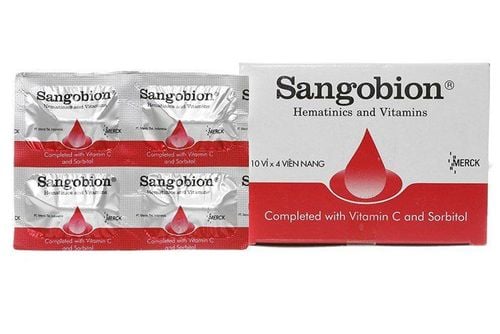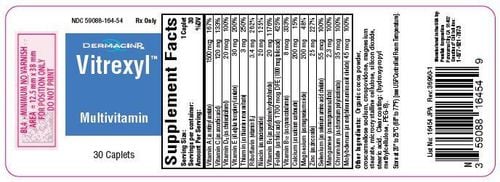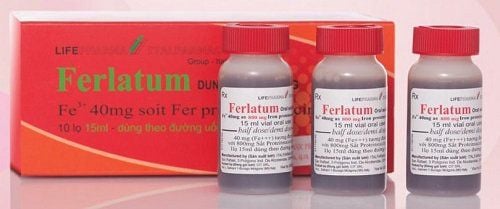This is an automatically translated article.
Iron, folic acid and vitamin B12 are essential micronutrients for the human body. Deficiencies in these nutrients can cause a variety of health problems. Therefore, the use of Tophem for supplementation is extremely important. So what is tophem and what disease does it treat?
1. What is Tophem?
Tophem is produced by Dong Nam Pharmaceutical Production - Trading Joint Stock Company, the main active ingredients include iron fumarate, folic acid and vitamin B12.
Tophem is prepared in the form of soft, oval, red capsules, the inside includes a red-brown drug. Tophem packed in a box of 10 blisters, each blister has 10 tablets respectively.
Ingredients and active ingredient content in 1 capsule Tophem
Iron fumarate: 162mg; Folic acid: 0.75mg; Vitamin B12 : 7.5ug
2. What disease does Tophem treat?
Tophem products are indicated for use in the following cases:
Prevention of iron deficiency anemia in high-risk subjects such as pregnant or lactating women, children of puberty, women women who are menstruating; Supplementing iron, folic acid, vitamin B12 for patients with blood loss due to surgery, trauma, worm infection or people who regularly donate blood.
3. Pharmacological characteristics of the drug Tophem
3.1. Pharmacodynamics Iron is one of the essential trace elements of the body, is a raw material in the production of hemoglobin and processes in living tissues that require oxygen. Iron supplements are used to correct abnormalities in the production of red blood cells caused by iron deficiency. Vitamin B2 when entering the body will be converted into methylcobalamin and 5-deoxyadenosylcobalamin (active co-enzymes) and plays an important role when cells replicate and grow. Vitamin B12 deficiency leads to impaired function of certain forms of folic acid needed in cells. Besides, this vitamin is essential for tissues with strong cell growth such as hematopoietic tissue, small intestine, uterus.
Folic acid is an essential material for nucleoprotein synthesis and maintenance of normal red blood cell production. Folic acid deficiency, similar to vitamin B12 deficiency, can cause megaloblastic anemia.
3.2. Pharmacokinetics Iron is unevenly and incompletely absorbed through the gastrointestinal tract, most of which are in the duodenum and jejunum. Factors that stimulate iron absorption include gastric acid secretion, iron in the form of iron II, the body in a state of iron deficiency or diet. On the contrary, iron will decrease absorption when the body's reserves are excessive. Vitamin B12 is absorbed through the intestinal mucosa, mainly in the ileum by 2 mechanisms: a passive mechanism when added to a large amount and an active mechanism that allows absorption at physiological doses but requires vitamin B12. Intrinsic glycoprotein secreted by parietal cells of the gastric mucosa. Folic acid is absorbed mainly in the small intestine and is widely distributed in the body. This nutrient is mainly stored in the liver, can be actively concentrated in the cerebrospinal fluid, and is excreted in the urine about 4-5 mg per day. In addition, folic acid has the ability to cross the placenta and be excreted in breast milk.
4. Instructions for using Tophem
4.1. How to use Tophem is used orally 1 hour before or 2 hours after eating.
4.2. Dosage Adults: Take 1 tablet of Tophem each time, 2 times a day; Children: Take 1 tablet of Tophem , only 1 time a day; Pregnant women: From the time of pregnancy, it is necessary to maintain taking 1 tablet / day. 4.3. Overdose and treatment Toxic dose of iron:
Under 30 mg Fe2+/kg body weight: Poisoning is moderate; Over 60 mg Fe2+/kg body weight can cause serious poisoning; The lethal dose is 80 - 250 mg Fe2+/kg body weight. In which, the lowest fatal dose in children recorded was 650 mg Fe2+. Symptoms of iron poisoning:
Initially, the patient may have abdominal pain, nausea, vomiting, diarrhea with bloody stools, dehydration, acidosis, drowsiness accompanied by shock; The patient will have a period of seemingly recovery when the symptoms disappear, but 6-24 hours later, the abnormal symptoms return with manifestations of blood clotting and cardiovascular collapse; Some other manifestations of iron poisoning include: High fever, hypoglycemia, liver toxicity, kidney failure, convulsions and coma. Tophem poisoning treatment:
The first step is to wash the stomach with milk or carbonate solution; Then proceed to pump deferoxamine solution; In case of need to raise blood pressure, Dopamine can be used; Dialysis in renal failure, correct acid-base balance, ensure electrolytes and rehydration.
5. Tophem side effects
Common undesirable effects when using Tophem are digestive system disorders such as stomach irritation, abdominal pain, nausea, vomiting and constipation.
When experiencing side effects, the patient should stop taking the drug and notify the doctor for timely treatment.
6. Contraindications of Tophem
Hypersensitivity or allergy to the ingredients in Tophem; Megaloblastic anemia caused by vitamin B12 deficiency; The body is in excess of iron due to diseases such as iron-contaminated tissue disease, hemosiderin infection or hemolytic anemia; Repeated blood transfusions; Stomach ulcer is progressing; Ulcerative colitis; Concomitant use with other preparations also containing iron.
7. Some issues to be careful when using Tophem
Caution should be exercised when using Tophem in patients with erythropoietic protoporphyria; Do not use Tophem in therapeutic doses for more than 6 months without the close supervision of a doctor; People who regularly receive blood transfusions should not take Tophem because the hemoglobin of the red blood cells that are transfused contains a large amount of iron and increases the risk of poisoning; Folic acid should be used with caution in cases of undiagnosed anemia due to the risk of masking pernicious anemia, progressing to neurological complications; Limit or do not use tea containing tannin at the same time, right before or after taking Tophem; Use caution in patients with folate-dependent tumors; Taking iron-containing products such as Tophem with food has the advantage of reducing stomach irritation but affecting the ability to absorb drugs; Using iron supplements can cause black stools in patients, in some cases requiring a blood test to rule out gastrointestinal bleeding; Tophem can be used by women who are pregnant or breastfeeding.
8. Drug interactions of Tophem . products
8.1. Interaction of iron Iron affects the absorption of drugs such as Fluoroquinolone antibiotics (such as Ciprofloxacin, Norfloxacin, Ofloxacin), Levodopa, Carbidopa, Entacapone, Tetracycline, Penicillamin, Levothyroxine, Mycophenolate, Cefdinir and zinc; Concomitant use of iron with Dimercaprol because toxic complexes may be formed; The antihypertensive effect of Methyldopa is attenuated when used concurrently with iron supplements such as Tophem; The absorption of iron is reduced when used in combination with Calcium, Zinc and Trientine; The absorption of iron is reduced when taken with antacids, proton pump inhibitors, certain foods (such as tea, coffee, whole grains, eggs and milk), Neomycin or Cholestyramine; Iron absorption is increased when combined with Ascorbic Acid or Citric Acid; The effect of iron is reduced when used with chloramphenicol. 8.2. Folic Acid Interactions Combined with Sulfasalazine reduces the absorption of folic acid; Oral contraceptives reduce folate metabolism, thereby reducing folate and vitamin B12 in the blood to a certain extent; Anticonvulsants when used concurrently with folic acid for the purpose of supplementing folate deficiency caused by anticonvulsants, the serum concentration of anticonvulsants may be reduced; Cotrimoxazole may reduce the therapeutic effect of megaloblastic anemia of folic acid; Concomitant use of chloramphenicol and folic acid in folate-deficient patients may antagonize the thrombolytic response of folic acid; Do not use folic acid concurrently with Raltitrexed. 8.3. Drug Interactions of Vitamin B12 Absorption of vitamin B12 is impaired when combined with Colchicin, Cholestyramine, Neomycin, Potassium chloride, Methyldopa and Cimetidine; Tophem concentrations may be reduced when used in combination with oral contraceptives; Omeprazole reduces gastric acid and thereby reduces vitamin B12 absorption; Parenteral chloramphenicol may reduce the effect of vitamin B12 in anemia.
Please dial HOTLINE for more information or register for an appointment HERE. Download MyVinmec app to make appointments faster and to manage your bookings easily.













